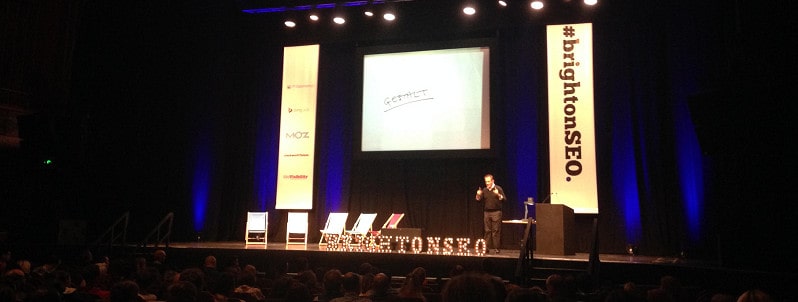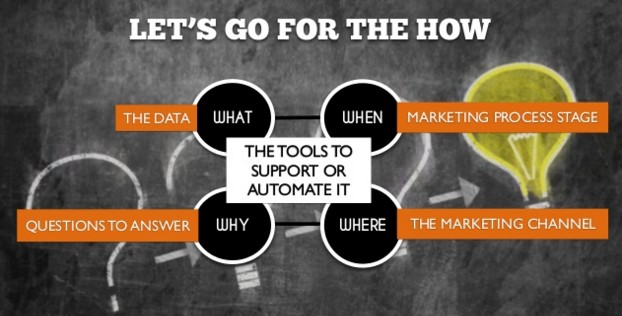We sent Zach and Chelsey down to the biannual brightonSEO conference in September (yes, we are well aware that it’s now December – sorry for the delay!). They returned packed full of the latest SEO knowledge from some of the industry’s leading heads. If you’d like to brush up on your SEO vocabulary before diving in, check out our SEO glossary. Use the links below to skip to sections that are of particular interest.

brightonSEO 2015 topics
Future of search
Technical SEO whiz, Jon Hibbitt offered his insights into the future landscape of digital marketing. Consistent with the current buzz around the importance of optimising your web presence for mobile devices, Jon predicts that a huge growth in the demand for mobile data will see 5G become available in the UK by 2020. With forecasted 5G mobile connection speeds of 1tbps, Jon suggested that mobile devices will be able to download a full HD feature length film in less than a second!
In addition to extrapolating the technical landscape of search over the next 5 years, the speakers also explored potential developments in user experience. Although some concepts seemed a little far fetched to be widely adopted by 2020 (high functionality 3D ecommerce websites), the discussion regarding personalised search engine result pages (SERPs) was thought-provoking.
The basic idea is that SERPs will continue to become highly personalised based on the way individual users perform searches (query type and overarching goal as well as search frequency) and the sites they already have a strong relationship with. Furthermore, you can expect geographically specific SERPs to be taken up a notch as the emphasis on local SEO continues to grow. The days of one-size-fits-all SERPs (and associated rankings) are well and truly gone.
Local SEO
Greg Gifford captivated brightonSEO with his ambitious attempt to fit 128 slides into his 15 minutes on stage. A definite contender for conference MVP in terms of directing the audience to useful local SEO tools including mini audits, link building and content ideas. For all the nifty local SEO tools recommended by Greg, check out his slide deck on SlideShare.
Also speaking on the topic of local SEO were David Mihm (Moz) and Jon Henshaw (Raven). The former emphasised how important it is for local SEO to have an accurate Google My Business profile that consistently matches your business’ contact details across the web. David also discussed the increasingly fragmented nature of search due to volumes increasing on iOs Spotlight and the automated information serving of Google Now on Tap.
Keywords
My favourite session from brightonSEO 2015. Three knowledgeable speakers from diverse backgrounds who all offered useful, slightly abstract approaches to keyword targeting and research.
Gianluca Fiorelli spoke of the inherent value of Google Trends for keyword research including geographical breakdowns of search volume. This is of particular importance when considering differences across cultures in the verbal expression of objects and phrases as well as structural or grammatical language variations. He also urged his audience to think abstractly when coming up with content ideas for “boring” businesses (his words, not mine). He used the example of a content plan for a concrete manufacturer being focused on all the amazing things architects, engineers and artists can do with concrete.

Image courtesy of Kaboompics
PPC whiz, Neil Collins then shifted the audience’s attention to the rapidly evolving field of online remarketing. Neil highlighted that recent advances in the targeting of remarketing lists is allowing for the execution of increasingly efficient campaigns. We’ve got a couple of remarketing whizzes of our own, one of whom simplified the concept in his post from July, ‘Remarketing made easier’.
Another contender for conference MVP in my book was Gerald Murphy – an extremely frank data analyst specialising in the way people interact with SERPs. Gerald uses demographic, situational and philosophical variables to first understand why we use search engines and then how we interact with the results we are delivered. Of particular interest was his analysis of how situational factors can impact on the way someone searches online.
Let’s say you’re using your smart phone on the bus. Your online behaviour in that situational context is heavily constrained by social norms and the natural aversion to ridicule – you’ll likely avoid looking at content that will diminish your social standing in the eyes of others. Gerald also discussed the driving forces behind the shift towards voice search on mobile devices, namely the difficulty of accurately performing a typed search as you walk. I’d suggest checking out Gerald’s slide deck if this stuff excites you as much as it does me!
Data
Any and all marketing activities should be data-driven. That was the overriding message from the morning’s data session. In practice, this means keeping your primary business objectives at the forefront of your mind as you make decisions and ensuring that the whole team knows your key performance indicators as well as how their activity impacts these goals.
A slightly bizarre (though fascinating) talk by Nikki Rae covered different interactive ways of communicating data to make it comprehensible, the basic principle being that if you can relate to data you can better remember and understand it. One example described demonstrating resource scarcity statistics with cocktail meatballs and sparsely distributed bowls of dipping sauce. Sound strange? Well, it is, but the idea is that an immersive data presentation can often bring home a point more clearly than a line graph.
Localisation
I also attended the LOMO (local and mobile optimisation) session, and the topic of customer reviews really stood out to me. Discussed by both Greg Gifford and David Mihm (see their slide decks for more info), reviews are an important ranking signal for local results as well as general conversion rate. So, how do you get more reviews? You ask for them!

Whether you set up a simple reviews page on your site or direct people to your Google My Business page (or alternative review site) in post-purchase communication is up to you. The important thing to note here is that 9 out of 10 people who have had a positive experience with you are willing to help or leave a review when asked. So, keep your customers happy, give them a gentle nudge to leave a review, and you’re on your way. Oh, and it also helps to make the process of leaving reviews as easy as humanly possible.
Technical
With the tantalising title ‘The 2015 Technical Marketer Toolbox’, the session led by Aleyda Solis had some really solid advice about the tools to use when you’re going about your marketing and analysing results. There’s a common perception that the next great tool will solve all of your problems and I got the impression the audience was expecting a rundown of the latest and greatest tools on the market. Aleyda, however, provided a framework for a solutions-based approach to choosing which tool(s) to sign up for. She suggested evaluating each potential tool on a requirements matrix to make sure it answers the following statement:
“The system must get [WHAT] at [WHEN] & [WHERE] to [WHY]”

- What = data
- When = marketing process stage
- Where = channel
- Why = questions needing solved
This will keep you focused on finding solutions rather than geeking out with the latest software kit.
Other highlights from the technical session included a talk from Mark Thomas about why Google is pushing for HTTPS sites. Quick summary: 1) HTTPS encrypted sites are safer for everyone involved and 2) to take advantage of the future of the internet (a fancy new protocol, HTTP2 that offers lots of cool stuff) HTTPS encryption may very well be required. Also covered in this session was advice and common pitfalls when it comes to implementing HTTPS in the wild. Curious for more? Talk to us today if you’re considering migrating your site from HTTP to HTTPS.
Forecasting
Everyone wants to know the future, and the three sessions on forecasting made some thought provoking points about forecasting methods that, even if they aren’t a crystal ball, can help you plan ahead for your business. Key takeaways:
- Beware of eyeballing – it can often lead you astray
- Don’t forecast using segments with data anomalies because it will throw off the whole forecast
- Update your forecasts frequently – nothing stays the same, so keep your forecasts relevant by evaluating them on a regular basis
At the end of the day, forecasting can’t solve all your problems, but keeping an eye to the future can help you set targets and keep your business on track.

Both Chelsey and Zach would like to thank the brightonSEO team for yet another great conference and can’t wait for the next one in April 2016!
